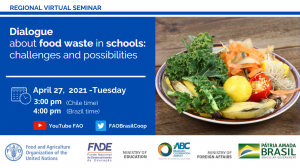Sustainable School Feeding Network promotes regional event about food waste in schools
Dialogue aims to build knowledge and exchange good practices for the mitigation of food waste in school environments in Latin America and the Caribbean.

Santiago de Chile, April 16, 2021 - Countries of Latin America and the Caribbean will participate, on April 27, in the Dialogue on Food Waste in Schools: Challenges and Possibilities, promoted by the Sustainable School Feeding Network (RAES), created by the government of Brazil in 2018. The event aims to promote dialogue among countries in the region for the construction of knowledge and the exchange of good practices related to the mitigation of food waste in school environments.
The virtual dialogue will present the scenario of losses and food waste in the region and a brief overview of the actions developed by the Food and Agriculture Organization of the United Nations (FAO) on the subject. Brazilian good practices for reducing food waste in schools and the initiatives developed in the School Feeding Programs of Chile, Guatemala and Colombia for the inclusion of gastronomy as a strategy for reducing food waste will be presented.
Government officials and technicians from countries in Latin America and the Caribbean and others interested in the subject will participate in the international event. The dialogue will be broadcasted live on social media: Twitter FAOBrasilCoop, FAO YouTube channel and Facebook FAO in Spanish, at 3pm in Chile and 4pm in Brazil.
The Sustainable School Feeding Network (RAES) is promoted by the government of Brazil, represented by the Brazilian Cooperation Agency of the Ministry of Foreign Affairs (ABC/MRE) and by the National Fund for Educational Development (FNDE/MEC) and has the support of FAO under the regional project 'Consolidation of School Feeding Programs in Latin America and the Caribbean'.
Created within the framework of the United Nations Decade for Action for Nutrition, the RAES network seeks to support countries in the implementation and reformulation of school feeding programs under the vision of access and fulfillment of the human right to adequate food.
Waste of food
With the gradual return of classes or hybrid classes in schools in the region, the process of food education on food waste is fundamental, an issue that concerns managers around the world. Food loss occurs throughout the food supply chain, from harvest to retail, while food waste occurs at retail.
A recent report by the United Nations Environment Program (UNEP) concluded that 17% of food is wasted globally - or 931 million tons of food. This is equivalent to 23 million 40-ton trucks fully loaded with food. The food waste index measures food waste at retail and at the consumer level.
